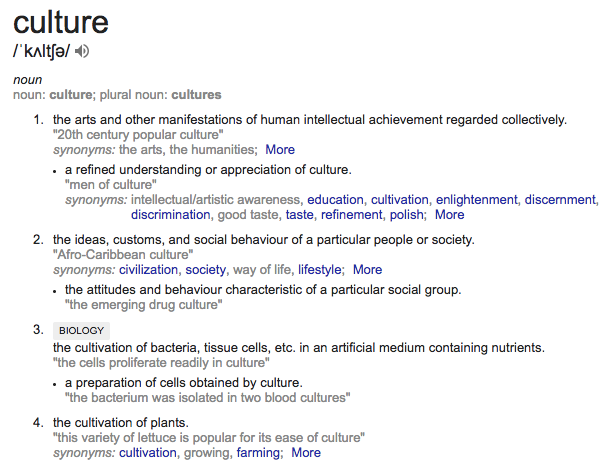Deciphering Company Culture: What’s in a name?

This is quite technical and meant for the company culture geeks. But if you enjoy history and surprises, stick around.
Culture in organizations has largely been associated with bean bags, casual dress codes, flexible work hours / locations and/or fun activities. So when people say they’re working on “improving” culture, they could be talking about vastly different things. As a result, organizations end up either working on surface level behaviours or in non synergistic silos and getting frustrated at the lack of change.
But before management theorists took over the term, culture meant something much more deeper and significant to the individual.
As a young father, I understand what it means to give a name to someone. It is not just a label but an attempt at articulating the beliefs and hopes one holds dear. When I transfer the principle to the word “Culture”, I was not surprised to realize that I had missed the deeper meaning behind this latest organizational buzz word. Rectifying this requires a little time travel.
The word “Culture” is based on a term used by the Ancient Roman orator Cicero (106–43 BC), where he wrote of a cultivation of the soul or “cultura animi”. He was using an agricultural metaphor for the development of a philosophical soul, understood teleologically as the highest possible ideal for human development. Wow!
Samuel Pufendorf (1632 -1694) took over this metaphor in a modern context. His use, and that of many writers after him, “refers to all the ways in which human beings overcome their original barbarism, and through artifice, become fully human.”
In 1986, philosopher Edward S. Casey (1939 — ) wrote, “The very word culture meant ‘place tilled’ in Middle English, and the same word goes back to Latin colere, ‘to inhabit, care for, till, worship’. To be cultural, to have a culture, is to inhabit a place sufficiently intensive to cultivate it — to be responsible for it, to respond to it, to attend to it caringly.
Terror management theory (very interesting reading in itself) proposed by Jeff Greenberg, Sheldon Solomon, and Tom Pyszczynski posits that culture is a series of activities and worldviews that provide humans with the basis for perceiving themselves as “person[s] of worth within the world of meaning” — raising themselves above the merely physical aspects of existence, in order to deny the animal insignificance and death that Homo sapiens became aware of when they acquired a larger brain. Double wow(!!)
So to truly work on company culture one must begin with a deeper understanding of the word to bring to reality the profound transformation in the individual and the collective that it promises.
